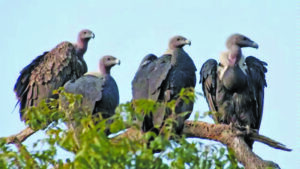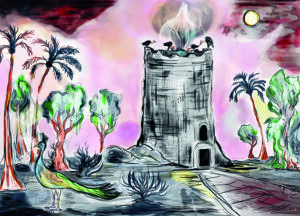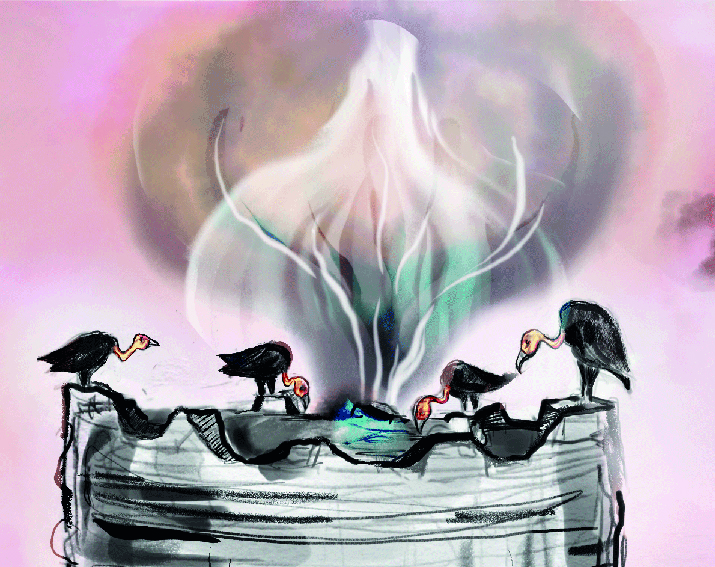 As is usually the case during the monsoons, Parsi Times has yet again been receiving an increasing number of messages and communications from community members who have expressed much concern over the functionality of the existing sacred Dokhmenashini system (adapted from the original Sky Burial system), for the dignified disposal of the final remains of our dearly departed loved ones .
As is usually the case during the monsoons, Parsi Times has yet again been receiving an increasing number of messages and communications from community members who have expressed much concern over the functionality of the existing sacred Dokhmenashini system (adapted from the original Sky Burial system), for the dignified disposal of the final remains of our dearly departed loved ones .
While the system worked with great efficacy until some decades ago, a number of factors have led to the relapse in this once functional, traditional practice of Dokhmenashini. The main reason for this is the decline and close-to absence of the vultures, which are mandatory to the smooth functioning of this system.
Solutions like the introduction of solar panels and bringing in new vultures, which initially gave much hope to help rejuvenate the functionality, have not been as successful in resolving this issue. The success has been temporary or seasonal, at best. The solar panels help speed up the process of decomposition of the corpse by concentrating heat on the body and the body thus begins to dehydrate and break down faster. However, the solar panels are unable to be as effective during the monsoons or even during the winter season, as the effectivity of these panels depends on the presence of the sun’s radiation, with their functionality getting compromised with cloud cover.
The once thriving vulture population is now on the endangered list mainly due to the painkiller and anti-inflammatory drug, called Diclofenac, which was widely consumed on a long-term basis, by Parsis (and livestock) and thus consequentially ingested by the vultures feeding on the corpses.
Though it is now banned in India, Diclofenac is known to cause kidney failure in vultures even when present in minute doses. As vultures typically feed together, one infected corpse could impact several birds at one time. It was the main cause which threatened the survival of these birds circling, ultimately leading to their near disappearance from the Doongerwadi.
This has led to corpses piling up in various stages of decomposition at the Doongerwadi, leading to much anguish and concern from community members, especially those who opt for Dokhmenashini for their family members and loved ones. As a result, many look to alternatives for the final rites of their dearly departed. The Prayer Hall at Worli in Mumbai is considered one such alternative. It created much uproar initially in the community – what is considered blasphemy for the orthodox has been a welcome relief for those looking for alternatives. More importantly, it proved to be a blessing to all through the pandemic, when the Doongerwadi was not allowed to continue the practice of Dokhmenashini, for safety reasons.
Mr. Dinshaw Tamboly, former BPP Trustee and current Chairman of the WZO Trust Funds (the community’s leading non-profit organisation which has been instrumental in supporting innumerable causes and coming to the rescue of countless community members during their time of need), has been instrumental in setting up the Worli Prayer Hall, which was the brainchild of community greats – late Jamsheed Kanga and Homi Khushrokhan, to facilitate the performance of obsequies for those who opted for alternate modes.
Mr. Tamboly’s earlier stint as BPP Trustee (BPP being the land-owner, overseeing the complete management of the Doongerwadi/ Towers of Silence) and his dedicated engagement in active community service for over four decades, provided him with greater insights into the specifics of the reality of this system. It is perhaps this reality which led to his participation as the frontrunner for setting up the Worli Prayer Hall. Ever since, he has been on the receiving end of as much backlash from the community as gratitude, in keeping with conflicting beliefs and preferences of community members.
Parsi Times catches up with Mr. Dinshaw Tamboly, who answers some crucial questions posed by community members…
Q: Do you really believe it was the right thing to do, to disturb the existing system of Dokhmenashini and provide encouragement to those from our community who were moving on to alternate modes of disposal?
Dinshaw Tamboly: Whilst change is the only constant in life, I believe that change should not be undertaken for the sake of change, but only when imposed upon by nature. It was indeed a very sad development that the once very effective system of Dokhmenashini had collapsed due to absence of vultures from Indian skies, necessitating introducing measures such as setting up of solar panels to keep the system going.
Believing that each one has the right to making their own decisions, I have never encouraged anyone to consider alternate methods of disposal, nor have I interfered in the decisions of those who chose to continue with the system of Dokhmenashini. What I felt to be inappropriate were the efforts made to create hurdles for those opting for alternate modes of disposal.
Q: What is the current status with regard to the presence of vultures?
Dinshaw Tamboly: It is a known and recorded fact that vultures began to vanish from the Indian skies since the beginning of the 1980’s decade. Various efforts are on by ecologists and conservationists to revive them. If the population of vultures could be resurrected, it would be a great boon for our community, as the system of disposal of mortal remains would be ecologically sound and done very quickly.
Q: How effective are the solar panels as such? Does it get worse during the rains and winters?
Dinshaw Tamboly: The solar panels can be said to be effective when the sun radiates, without cloud cover. During monsoons and winter, the effectiveness is definitely impaired.
 Q: What made you take up the cause of being involved in setting up of the Prayer Hall at Worli?
Q: What made you take up the cause of being involved in setting up of the Prayer Hall at Worli?
Dinshaw Tamboly: Believing in the efficacy of our prayers, I have always held that the ceremonies performed during the first four days after death are very necessary for the progression of the soul, from the physical to the spiritual realms. It was very distressing to learn that an edict was passed by religious heads that no prayers should be performed for the first four days by Mobeds for those who opted for modes of disposal other than Dokhmenashini.
I also found it rather perplexing that that whilst there was a bar on performing the prayers for the first four days, there was no bar on prayers and other rituals being performed from the fifth day onwards, by the very Mobeds who were earlier advised not to perform obsequies for the first four days.
With the once very effective system of Dokhmenashini having become ineffective due to disappearance of vultures, gradually increasing number of community members have begun to opt for alternate modes of disposal, more relevant to the times we live in. It was thus very essential that a facility to perform obsequies for those who opted for alternate modes of disposal should be established. I therefore actively collaborated with late Jamsheed Kanga and Homi Khushrokhan, whose brainchild it was to set up a Prayer Hall, which has provided a necessary facility to those opting for alternate methods of disposal.
Q: PT has been given to understand by Mobeds at Mumbai and Navsari that you have had ceremonies such as Vandidad’s, Nirangdins, Hama-Yasht performed for the elders of your family. Why then have you take a pro-cremation, anti-dokhmenashini stand?
Dinshaw Tamboly: Having always believed in the efficacy of our prayers, I considered it my duty to have various higher religious ceremonies being performed for my dear family member who have moved on to the higher realms. I have never taken an ‘anti-dokhmenashini’ stand and have never dissuaded anyone from continuing to use this system. I believe that each individual should be permitted to choose whichever method they opt, as regards the final rites of their dearly departed loved ones, for which the important obsequies of the first four days should not be denied.
Beliefs on religious issues and relevance of various traditions are for each one to have and follow as per what they feel and believe to be essential. What may be acceptable to some may not be acceptable to others. It is for each one to do and follow what they feel to be is essential and relevant.
————————————————————————————————————————————————————————
Earlier this year, Parsi Times had covered the news on efforts being made to reintroduce vultures in Doongerwadi, by the Bombay Natural History Society (‘BNHS Plans Reintroducing Vultures In Doongerwadi’ in PT edition dated 28th January, 2024), to counteract their dwindling numbers, by working with the community to achieve this objective.
After tasting success in having released ten long-billed vultures in Pench National Park and Tadoba Tiger Reserve, BNHS would now be focusing on efforts towards repopulating the vulture population in Doongerwadi. BNHS officials had met with some community stakeholders regarding this endeavour, with the hope of collectively setting up an aviary at Doongerwadi itself, where vultures could thrive. The BPP has also responded positively and looked to establishing dialogue with BNHS towards this end.
BNHS President, Praveen Pardeshi, had expressed hope that once the vultures were introduced in the aviary, they could adapt to their ecological role. The vultures introduced from a different region would need special care for their survival – like the maintenance of thick foliage, though it would be difficult to control the consumption of Dicloflenac from corpses. The birds would be well looked after in terms of being provided alternate food sources, when needed.
Here’s looking to the success of this project, which would be pivotal to the continued smooth and functional perpetuity of the sacred Dokhmenashini system. But till such time or not, or then, even for those who nevertheless opt for alternative means of final rites, the Worli Prayer Hall will continue to serve community members.
- માહ બખ્તર – ચંદ્ર પર પ્રભુત્વ ધરાવતું દિવ્યત્વ - 1 March2025
- હાંસોટમાં 100 વર્ષ જૂનાપારસી પેલેસમાં લૂંટ - 1 March2025
- હૈદરાબાદની ચિનોય અગિયારીએ સાપ્તાહિક હમબંદગીના 19માં વર્ષની ઉજવણી કરી - 1 March2025
